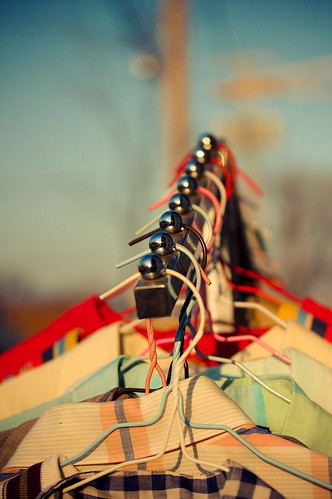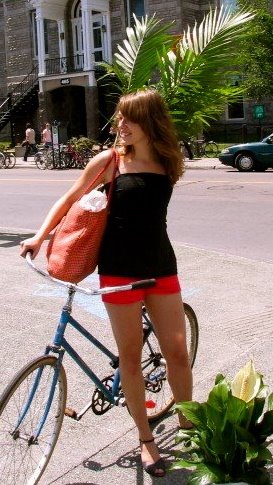Because I generally lead a charmed albeit somewhat pitiable life, I spent a fair amount of time touching topless 19-year-old girls this week. If you can say the same, I pray it's because you work in fashion, and that it's genuinely in your job description.
I did it because, being unemployed, I have nothing else to do at the moment and one of my favourite new friends in London – who happens to work for a popular women's fashion magazine – took sweet, sweet pity on me. Inviting me to stand in as her fashion assistant at a photo shoot might be a good way to keep me busy, she rightly thought, but gave me fair warning that there's little glamour to be had behind the scenes.
"You'll have to steam the clothes for the shoot," she advised, "and probably get coffee and tea. And you'll have to take orders from me when we're in the middle of everything."
"So, I'd be your bitch?" I asked, amused with the prospect.
"You'd be my bitch," she answered, just as amused.
"I'd love to."
Just in case, she called again when I'd had time to think about it."If this is your idea of Hell..."
But equal parts curious and clueless about what might be ahead, I genuinely wanted to be her bitch for a day. Maybe it would remind me of what it feels like to be employed, I thought.
I arrived with my own ideas about the fashion industry. The kind derived from Nineties-era teen magazines – when Hareem pants were still Hammer pants – packed with beautiful people and clothes you'd never find in rural Canada. Not unless Frenchy's, the second-hand clothing warehouse, received a particularly rich bulk shipment from the United States. But you had to be careful in those days. Creativity could get you pummelled, and I already did my fair share of running from bullies.
 All the way from a Frenchy's in small town Nova Scotia to working behind the scenes with models, make-up artists and photographers at a fashion shoot in London. And to think I would be listed in miniscule among the magazine credits for steaming clothes and getting drinks, regardless of the fact that everything I know about fashion I learned from Sex and the City – a TV series that ended years ago. I considered it my duty to see the irony through to fruition.
All the way from a Frenchy's in small town Nova Scotia to working behind the scenes with models, make-up artists and photographers at a fashion shoot in London. And to think I would be listed in miniscule among the magazine credits for steaming clothes and getting drinks, regardless of the fact that everything I know about fashion I learned from Sex and the City – a TV series that ended years ago. I considered it my duty to see the irony through to fruition.She knew what I was thinking. "Just try not to mention the name of the magazine when you write about it, okay?"
First, she showed me how to use the steamer without burning myself, but as soon as she left me alone with it, I did. When she came back to check on me, I was still struggling with the same top, alternately removing and inadvertently adding creases. But she had bigger things to worry about. The model was late.
The woman who'd be paid to pose in the clothes I burnt myself steaming was late, and no one knew where she was. I expected her to be moody, rude, demanding and beautiful, but not late.
All morning there'd been a buzz in the studio, as everyone prepared a specialist element: makeup, lighting, cameras and clothes. All the model had to do was show up. That's when I realised that the success of the day depended on a 19-year-old girl.
Forty-five minutes later, when she finally arrived, there was an audible whistle in the room, as everyone exhaled through clenched teeth and then slapped on their most professional smiles as she sat down to be primped and beautified. I poked my head around and thought that despite her height, she was surprisingly average. But I was soon to discover, when it came time to dress her that she was actually above average, by a few unexpected kilos.
"You have to dress them," my friend, the stylist and artistic director, had warned. But I didn't really get it. I thought I'd be handing her clothes and straightening collars, but not lifting off her tops and doing up her shoes. It was surprising for me to discover that models expect others to dress them in even the simplest of articles, and even more so that I would be doing it. When I first lifted off her top, I felt remarkably unqualified for the job. I was shit at steaming, and I'd never dressed anyone over the age of two.
What was most surprising, though, was that the model was too big for the clothes. The UK size 10 clothes (a Canadian 6) didn't fit, and we couldn't zip the first outfit up. My friend tugged, tucked and arranged the girl as best she could without drawing on any of the heavy words floating in the silence of that tiny back room.
When the model emerged to pose in that first outfit, the team threw each other worried looks. Finally the photographer discretely whispered, out of the model's earshot, "I can't shoot her, she's too fat." Another audible whistle passed through the room, this time from air sucked in through that same collection of clenched teeth – an apt soundtrack to the sort of what-the-eff-are-we-going-to-do awkward position they were in.
 But the model was ready, in all her robust glory, and the team tried their best to make the shoot work – more blush to thin her cheeks, strategic positioning of clothes and limbs, and finally cropped shots and cancelled outfits. It wasn't until mid-afternoon, when the model had successfully sausaged in and out of everything at least once, and was photographed with the standard pouty lips and sultry gaze into the aether, that the team's whispered panic grew into an unavoidable reality: I was going to have to steam those clothes again.
But the model was ready, in all her robust glory, and the team tried their best to make the shoot work – more blush to thin her cheeks, strategic positioning of clothes and limbs, and finally cropped shots and cancelled outfits. It wasn't until mid-afternoon, when the model had successfully sausaged in and out of everything at least once, and was photographed with the standard pouty lips and sultry gaze into the aether, that the team's whispered panic grew into an unavoidable reality: I was going to have to steam those clothes again.The agency was sending a thinner model, scheduled to arrive once the first was safely out of range so as to avoid any upset. We were going to redo the shoot. Apparently the agency had told this first model to gain weight as she was previously too thin, but she'd taken the idea and run with it a little too enthusiastically. I think she knew, though, because she didn't even touch the green salad she'd requested for lunch.
By the time the second model arrived, my relationship with taffeta, rayon and even cotton was on the rocks. She was thin and perfectly proportioned, and everything I'd assumed a model would be except high maintenance. But we still had to help dress her.
In a taxi on the way home, my friend asked me whether the fashion shoot was as I'd expected. It wasn't, and I told her so. Pleasantly surprised, I've always thought of the fashion industry and modelling as terrifyingly superficial, cut-throat, and self-esteem destroying, but everyone treated the first model so sweetly, and they managed the issue of her terminal weight gain impressively discretely.
"Oh, you have to always, always keep your models happy," she assured me, in a tone which implied this was a golden rule. "Always," she repeated for emphasis.
"Is that because they can be so tempermental?" I asked, vocalising the stereotype and offering a final bit of naïveté to close the day.
"No," she smiled wryly. "If they cry, you have to stop and redo their makeup."








No comments:
Post a Comment